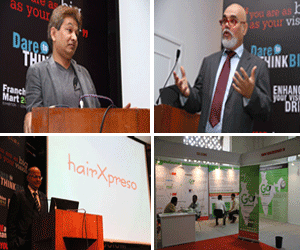Indian government should change its laws governing the Internet and create a favorable ecosystem for entrepreneurs and startups in the country, says Eric Schmidt
Why Google?
From 1997 to 2001, I was Chief Executive Officer of Novell. I wanted to work in a company which is near my home and run by bright people. Larry and Sergey were brilliant and I thought it would be fun to work with them. The rest is all a lot of good luck. However, do not always look for luck but look for the smartest and the brightest people to work with. There would always be people smarter than you so try and seek them.
Large to small
I moved from a large office with lots of staff to a corner desk in a room that five people shared. We bonded very well and one day one of the engineers in the office wanted to shift near my desk since he felt he wasn’t being used enough. That person, who is an Indian, and me are now best of friends.
Scaling
We are not perfect and we have made mistakes. However, our performance today speaks of our success. If you are a startup do not accept the routine and once you decide to change the world, start looking at the bigger picture. There are so many examples of startups that have a great product, prototype does well, gets good funding but as users increase it begins to break. It probably was not built to anticipate millions and billions of users. Technical proof of the product is very important and very often startups see a surge of users, it then falling apart and no one coming back again.
Vision
The world is a much bigger place than you think it is. India is a bigger place than I though it was. The complexities, diversity drives us all.
Most people find the opportunity by listening to their heart. When we started Google we focused on all the world’s information and we said we will also include what is on the web so far. I think it is a good example of how to think big.
Opportunity and challenges for India
India ruled the outsourcing market very successfully for years but has not tasted the same success in web services and web programming. I wonder why not. My guess is that internet and connectivity is lagging. There are about 20 million broadband customers and 130 million internet user. This is roughly 10 percent of the population. Imagine what will happen in the next 3-5 years as the country sees 600 million users or 800 million users. Mobile, software services, e-commerce and many other sectors would get a huge fillip. Others to benefit will also be the regional languages as internet was not devised only with English language in mind. China’s internet is bigger than any other internet and I do not see any reason why India’s growth cannot be larger. There is enough competition amongst the firms here, there is capital and more importantly the demand exists.
Creating Silicon Valley in India
I think there is good chance of creating the Silicon Valley in India for a number of reasons. One of the most interesting statistics of Silicon Valley is that about 40 percent of the startups are done by Indian born entrepreneurs. We know that young Indian entrepreneurs in the valley have the skills and the education to startup. So we know that the education system here produces such people. Where are such people likely to be in the country? These people are more likely to be in the top universities. Institutes like the IITs are a great place to find such people.
The second thing you need is money. You do not need a lot of money but you need Venture Capital to be present. Most investors are unwilling to take the risk during the early stage but you need investors who understand strategic investment, portfolio investment and others.
Thirdly the government needs to fix laws. There are a set of things to be fixed by the Indian government.
One of the laws India needs to change currently is the one which holds Internet companies liable for content posted by users. For example there was a series of British Copyright, which has since been changed, that would have made Google illegal if started in that country. If you wondered why no one started a Google in Britain, now you know the answer. The role of the government is to bring down barriers which impede innovations.
Now why would someone want barriers to innovation? That is because the incumbents want them. The incumbents do not want competition.
The last thing they would want is some startup of young people coming out from one of the IITs and disrupting their model.
It is called creative disruption and incumbents in every county try to prevent it by putting roadblocks.
It is very important for a country to recognize those roadblocks and encourage innovation. Innovation creates job and creates wealth.
Next big thing
The next big thing we believe is the mobile. It was the next big thing last year and also the year before. There will be 100 and millions of new mobile customers and all primary experiences would be on the mobile phone. If you are not building mobile applications I do not think you are doing the right thing. The next big thing also according to me is the large data centers. Large data analytics is going to be very important and I would bet every company would be more efficient and profitable by building these straight forward data analytics.
Gangnam Style going viral
I do not know what makes things go viral. Park Jae-sang or Psy is a creative genius and I do not know what clicked for him. What I do know is there will be another one and another one and after that many more to go viral on the internet. The internet has allowed creative and talented people to showcase their flair and I think this is a good thing.
I am sure Park would try to recreate his success but I am sure his competitors will also innovate. Park’s video has been seen more than a billion times and who would have thought a video could have such reach. On the topic of Youtube, it is doing incredibly well in India despite the terrible bandwidth.
Eric Schmidt is the Executive Chairman of Google Inc.































 +91 9909960054
+91 9909960054